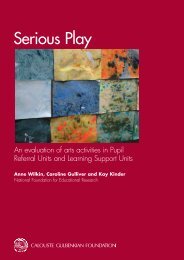Why Restorative Justice? - Calouste Gulbenkian Foundation
Why Restorative Justice? - Calouste Gulbenkian Foundation
Why Restorative Justice? - Calouste Gulbenkian Foundation
Create successful ePaper yourself
Turn your PDF publications into a flip-book with our unique Google optimized e-Paper software.
INTRODUCTION<br />
families when a parent or third party mediates between warring<br />
family members. It happens in schools, at work, between friends, or<br />
couples splitting up or trying to stay together – making up, or at<br />
least making good the damage done. Often the local bobby, known<br />
to his community and who knows them, quietly mediates between<br />
disputants rather than bringing them to court.<br />
Mediation often involves explanations on both sides, for the<br />
issue or misunderstanding to be cleared up. Along the way, revelations<br />
may cause tears and rage, embarrassment and shame. It may<br />
take several sessions before issues are resolved to parties’ joint satisfaction.<br />
But when and if they are, the feeling of having achieved<br />
something, having moved through the problems or dispute, reaching<br />
forgiveness, acceptance or compromise, is tangible. Something<br />
has happened. Something has ended. We can move on.<br />
Mediation<br />
There are many kinds of mediation which provide a restorative<br />
approach in institutions and in the community. The<br />
process and details of each mediation are kept confidential,<br />
although the outcome or agreement is usually in the public<br />
domain, especially if there is a legal issue.<br />
• Peer mediation in schools<br />
• Family mediation for child issues in divorce<br />
• Family group conferences concerning child welfare<br />
• Neighbour mediation<br />
• Multi-party mediation<br />
• Community conferences<br />
• Medical mediation<br />
• Employment and workplace mediation<br />
• Commercial mediation<br />
• Environmental mediation<br />
• Political or international mediation<br />
• Victim/offender mediation<br />
This restorative approach is recognised in the recent reforms in civil<br />
justice (1999), which emphasise the use of alternative dispute<br />
resolution (ADR) and mediation before cases are taken to court, and<br />
10

















